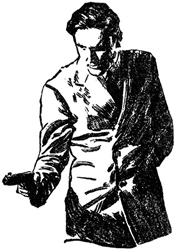

Springdale Municipal Court. Part A.
Judge Harry Loomis presiding. A youngish-looking man, graying blond with a cowlick, and indigo eyes, dark like a computer’s Blue Screen of Death.
“Docket ending 638,” the bridgeman was saying. “The People versus Truman Anton on a 195.00—official misconduct—and 195.05—obstructing governmental administration.”
“Counsel,” Loomis said, “for the record, state your name.”
Harry surveyed the room.
The court had been built during the Depression and above the bench had a mural of a Pilgrim and an Indian lounging on either side of the Massachusetts State Seal. Around their feet, spilling from a curdled-cream-colored cornucopia were pumpkins, squash, corn, apples, and grapes. To the right of the Indian, railroads branched out across plains and farms to distant mountains. Muscular farmers steered plows pulled by blocky oxen. To the left of the Pilgrim, factories and dynamos and blast furnaces, rank upon rank, led to distant cities with towering skyscrapers. Muscular factory workers hammered red-hot steel plates. Airplanes crowded the skies.
Harry noted the absence of muscular bankers.
“I’m informed the defendant has a hundred twenty thousand equity in his house,” Loomis was saying. He pronounced defendant with the accent on the last syllable. “I’m setting bail at one hundred thousand dollars.”
The room had high ceilings and, below the ceilings, walnut paneling. The bottom two-thirds of the wall had been renovated in the 1970s with an institutional, nondescript substance that looked—to Harry—like pine-patterned plastic.
Loomis sighed. “Next?”
Harry stood before the bench. To one side was O’Neill. A little behind them were Rossiter and Bender.
Friday, Carol, and Phil sat on molded orange plastic chairs, watching the proceedings.
Harry could smell O’Neill’s lilac aftershave.
“Pinaud Clubman Vegetal,” Harry said to O’Neill. “You got that from the barbershop on the corner of Webster and Hollins, I’ll bet.”
“Mr. Dickinson has a clean sheet,” Loomis said.
“Only place I know still uses the stuff,” Harry said to O’Neill.
“Roots in the community,” Loomis said.
“I like that,” Harry told O’Neill.
“Mr. Dickinson,” Loomis said.
“Mom-and-pop business,” Harry explained to Loomis.
“I know the shop,” Loomis said.
“Needs all the custom it can get,” Harry said.
“Farley’s,” Loomis said.
“Corner of Webster—”
“And Hollins.”
“Jimmy Farley’s what?” Harry said. “Must be eighty-five.”
“Eighty-seven,” Loomis said. “He’s been cutting my hair since I was a kid.”
“Me, too,” Harry said. “Used to get a crew cut.”
Loomis smiled at his own memories.
“My brother used a wax stick to make the front hairs stick up. No Mohawks. No pink tints, dye … Another world.”
“Dodgers still in Brooklyn,” Harry said.
“You got me there, Mr. Dickinson,” Loomis said. “I don’t go back that far.”
“Neither do I,” Harry said. “But it’s nice to think of back then.”
Loomis sighed again and said, “Yeah. Back then…”
“Jock Whitney invented the crew cut,” Harry said. “Or named it.”
“He from Classical?” Loomis asked about the high school.
“Out of town,” Harry said.
“Your Honor,” O’Neill interrupted.
“Is this the man who…?” Loomis glanced at the bridgeman. “Is this the 5150?”
“I’m the 5150,” Harry said. “The consensus is: I may be a danger to myself or others.”
“Are you?” Loomis asked.
“A danger to malefactors, punks, miscreants, yeggs?” Harry said. “Absolutely!”
“Yeggs?” Loomis asked.
“Burglars,” Friday said.
Loomis looked at her. Sharply.
She met his gaze.
“Yeggs, huh?” Loomis said. And studied Harry.
“Normally,” Loomis said, resuming his official tone, “I’d be inclined to let Mr. Dickinson go under his own recognizance. But…” Loomis picked up a sheet of paper. He looked over his half-glasses at Carol and Phil’s lawyer, Jack O’Neill, and said, “Mr. O’Neill, this affidavit?”
“A history lesson,” O’Neill said.
“I can see that,” Loomis said.
“Tonight,” O’Neill said, “the cuckoo did a banana job. Par for the course.”
Loomis picked up another document—commitment papers—and, scanning the courtroom, said, “Dr. Bender?”
Bender stood up.
“We have the clinic van outside,” he said.
Loomis sighed.
“My opinion,” O’Neill said under his breath, half-turning to Phil, “no one wants it, but your brother-in-law’s on his face, and the count is nine.”
“Given the circumstances,” Loomis said, “I’m going to remand Mr. Dickinson over to an appropriate psychiatric facility for observation.”
Loomis banged his gavel.
“They can only hold you initially, Mr. Dickinson,” Loomis told Harry, “for seventy-two hours.”
“You look like you could use a trim,” Harry said to Loomis, who touched his hair. “Give my best to Jimmy.”
“Will do,” Loomis said. “And, Mr. Dickinson…”
Harry smiled.
“Good luck,” Loomis said. Then: “Next case.”